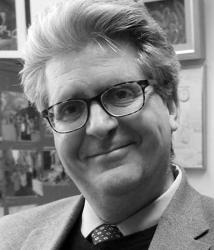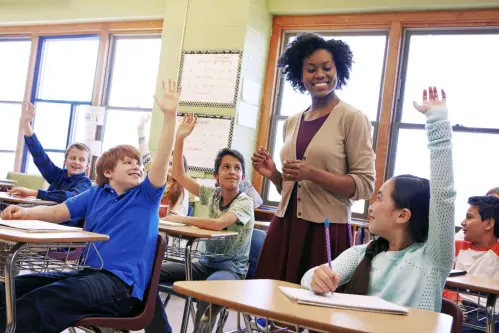The following essay comes from “Meaningful education in times of uncertainty,” a collection of essays from the Center for Universal Education and top thought leaders in the fields of learning, innovation, and technology.
 The remarkable global expansion in access to public education which took place over the past seven decades, benefited from a broad consensus regarding its power to advance diverse goals, assuming limited tradeoffs between them. The idea that everyone should be educated is relatively recent. It is primarily an outgrowth of the Enlightenment and a product of liberal political thought.
The remarkable global expansion in access to public education which took place over the past seven decades, benefited from a broad consensus regarding its power to advance diverse goals, assuming limited tradeoffs between them. The idea that everyone should be educated is relatively recent. It is primarily an outgrowth of the Enlightenment and a product of liberal political thought.
The establishment of public education, understood by the founders of the first democratic republics to be essential to the well-functioning of democracy, benefited from global cooperation. For example, on a visit to seek assistance from the British, Simon Bolivar (one of the leaders of Independence in South America) was introduced by Francisco de Miranda, who lived in London, to Joseph Lancaster, the creator of the monitorial system of instruction, which allowed extending education to low-income students. Bolivar would eventually persuade Lancaster to move to Caracas and establish the first teacher training institution. Similarly, Venezuelan born Andres Bello, serving as the first rector of the University of Chile, created a contest inviting faculty to design approaches to educating citizens in the newly independent republic. Argentinean Domingo Faustino Sarmiento, a faculty member at the University of Chile, submitted and won the contest with his thesis ‘Popular Education’ an approach which drew on his conversations with Horace and Mary Peabody Mann, who led the movement for public education in Massachusetts.
Scientific research and the modern research university are also at heart cosmopolitan enterprises. When some of the signatories of the United States declaration of independence chartered the American Academy of Arts and Sciences in 1780, the oldest scientific academy in the United States, they tasked it not only with the promotion of scientific inquiry to advance the public good, but with the promotion of exchanges among scientists, no matter their country of residency.
In the modern era, the challenges to liberalism from communism and fascism brought alternative goals for public education, challenging the notion that individuals could be free to choose which education to pursue, and emphasizing political and economic goals, as well as downplaying human rights and modernization goals. Those challenges helped those who valued freedom and equality think with greater moral clarity about the need to align education institutions to the institutions of democracy.
The construction of the post-war order which began with the establishment of the United Nations and the approval of the Universal Declaration of Human Rights brought also into focus the moral purpose of educating all persons. Article 26 of the Declaration of Human Rights emphasizes that the point of educating all is to educate them in the rights of every person, and in the institutions which have been created to advance them. The declaration is, therefore, a seminal document in the advancement of global citizenship, and article 26 calls for education for global citizenship, a cause that U.N. institutions have advanced episodically during their history.
Post-war challenges to public education
The tensions between the Soviet bloc and the liberal world during the cold war, however, impeded the development of a global consensus with respect to advancing a global citizenship agenda. This is perhaps the reason why the tacit operational education consensus of many of the international development institutions created after World War II evolved into getting all children in schools rather than focus more intentionally on what they should learn in school or how what they should learn should align with a liberal cosmopolitan vision of freedom and equality, as had been intended in the U.N. charter. Consensus on those topics was as difficult to reach in international institutions as it was in societies in which there is much political contestation. This is perhaps the reason the Programme for International Student Assessment (PISA) studies so far have focused on domains such as literacy, mathematics, and science, and not on domains like civics or global citizenship, it is perhaps the reason multilateral and bilateral banks have seldom addressed questions of curriculum content, and seldom funded education operations designed to promote democratization, and the reason organizations like UNESCO have found it difficult to advance human rights education around the world, even though they were created to do this. It should be noted that the OECD has been working for the last several years in efforts to add a dimension of global competence to the PISA assessments, but reaching consensus among the governments participating in these discussions on the merits and approaches to doing this has proved challenging and it remains to be seen whether the dimensions of global competency which are included in the assessment include civic dimensions or merely dimensions relevant for economic competitiveness. In spite of these challenges, the United Nations institutions made efforts to advance global citizenship, most recently as part of the Sustainable Development Goals agenda which included for the first time in 2016 a focus on educating for global citizenship.
Given the difficulties in reaching explicit consensus on the value of aligning education goals with a liberal cosmopolitan vision of freedom and equality, many nations as well as international organizations focused instead on particular competencies, as goals for the public education system, without attempting an integrated view of how those competencies would align with a democratic vision advancing the values of freedom and equality. Speaking about ‘skills for a knowledge economy’ was less contentious, in international fora, than speaking about ‘skills for a democratic society.’
It is arguably for this reason that the curriculum frameworks in most countries focus on the basic literacies of language, mathematics, and science, but to a significantly lesser extent on civics. Increasingly curriculum frameworks are expanding to include other competencies, not only to other cognitive domains, but to social and emotional domains. Governments and educators now are also interested in character, self-regulation, self-awareness, grit, tolerance, or leadership. But, for the most part, those interests are not framed as part of a vision of how the integration of those capacities will enable individuals to, individually and collectively, advance social or economic goals. This is a difficult conversation to have in settings where there is no consensus on which place the country should occupy in a global economy, a conversation which will become more difficult as the values of liberalism become more contested.
In spite of these challenges to developing clear and coherent visions on the purposes of public education, however, the dominance of liberalism as the organizing principle of the post war order, particularly given the support of countries with large economies also committed to liberalism, fueled a set of education purposes more or less aligned with the ideals of freedom and equality, even if those were not spelled out explicitly.
The rise of populism
Such tacit consensus on the reason why nations advance public education and cooperate with others in this enterprise is increasingly challenged by an emerging populist ideology. Populism posits that ordinary people are exploited by elites and challenges the notion of representative democracy with direct action by the masses. Since direct action by large numbers is impractical, too often populism results in autocratic rule by a leader, communicating directly with the masses, unobstructed from intermediary institutions and from the normal division of power and checks and balance of democratic government. Some recent populist leaders include Hugo Chavez, in Venezuela, Evo Morales in Bolivia, Alberto Fujimori in Peru, and more recently Donald Trump in the United States.
Modern populists exploit the following ideas. First, that globalization, and liberal policies, do not benefit all, and that there are important groups of the population who are left behind, and without hope of seeing their conditions improve. They attribute this to elites who are not accountable to those groups, and to a model of development that fails to envision a role for these groups which are left behind. Populists exploit also cultural divides among the population, deep differences in values and worldviews.
An array of views held by populists challenge the ideas of a universal project to advance freedom, equality, and human rights, to globalization, and, by implication, to universal public education.
The educational implications of populism.
It is consistent with populist views to advocate more power to local groups to define the goals of education, and less role for government and for inter-governmental institutions. Replacing global and national politics with local politics of course does not mean more consensus, it may mean more conflict, perhaps with less rules of arbitration. The divisions between cosmopolitans and populists exist in local communities. One question is how these differences will be resolved? Will the rule of law and expertise continue to play a role? We should expect less trust in public education institutions, resulting from less trust in governments, in experts and in elites. It is also possible that we will see a renewed emphasis on identity politics and culture wars in education.
There are some risks we can expect to emerge from these emerging challenges to the liberal values of freedom and equality as organizing principles of public education.
The first is a risk to the idea of human rights. If nationalism is the new organizing force, the notion of in group and outgroup is defined by citizenship, not by membership in humanity, a challenge to the cosmopolitan foundation of the liberal values of the Enlightenment. Because one of the consequences of globalization has been migration, non-citizens will be the first target for exclusion. If cultural wars define the politics of education we should expect to see an increase in the ongoing battles over the rights of cultural and ethnic minorities, for instance the right to see themselves represented in the curriculum. In the United States, for example, there are individuals and groups lobbying schools for changes in the curriculum which reduce the emphasis on global topics and content. Conservative groups have long engaged in battles over the curriculum and textbooks in schools, these battles have augmented since the last presidential campaign as reported to me by a number of teachers and school leaders working in global citizenship education efforts. In New Jersey, for example, the director of English and social studies of the Rumson Fair-Haven regional high school was recently challenged in a petition organized by a parent to eliminate two books which were used in the history curriculum (Ariel Dorfman’s Death and the Maiden and Bernard MacLaverty’s Cal), and to eliminate globally-oriented texts such as. Chimimanda Ngozi Adichie’s Americanah). The efforts to ban books such as these from the curriculum continue by advocates who self-identified as having been mentored by national advocates of similar efforts, such as Dr. Sandra Stotsky, one of the expert witnesses who testified in the court case involving the Mexican American Studies Program in the Tucson Unified School District, whose advocacy has been promoted by the Breitbart’s website (Jack Shea, personal communication, May 2017).
A second risk concerns global challenges. The prospects for collective action diminish as the world moves towards national populism, and the goals of education move away from preparing students to understand global interconnectedness and globalization.
A third risk is a breakdown of the institutions that were created to protect freedom, democracy, the rule of law, public education, and basic freedoms. This is the risk that populism might evolve into fascism. There are early warnings in schools of this risk. The sharp increase in intolerance in America has been clearly expressed in and around schools and universities, in the form of more explicit expression of anti-semitism, white supremacy, Islamophobia and hatred towards people of color and immigrants.
The risk of disorder. Lack of trust in institutions, elites, and governments, will make the challenge of resolving conflict greater.
Can the institutions created to advance a liberal world order, save it?
Individuals or institutions interested in a global liberal order should consider a new focus and emphasis on education for democratic citizenship, including global citizenship. This means supporting educators so that schools can advance human rights, educate about shared global challenges, educate for engaged citizenship, focus on dispositions and values as much as skills, and attend to the conditions that make it possible for schools to be effective in achieving these goals. Education was always meant to be cosmopolitan, global education, but this notion was implicit because the expansion of public education was part of a project that was global and widely supported. This project is now contested, and for this reason the ethical foundations of education need to be pursued intentionally, with greater resolve and effectiveness than ever.
This essay draws from the book by Fernando Reimers “One Student at a Time. Leading the Global Education Movement.” Createspace August 2017.



Commentary
Op-edRediscovering the cosmopolitan moral purpose of education
August 3, 2017